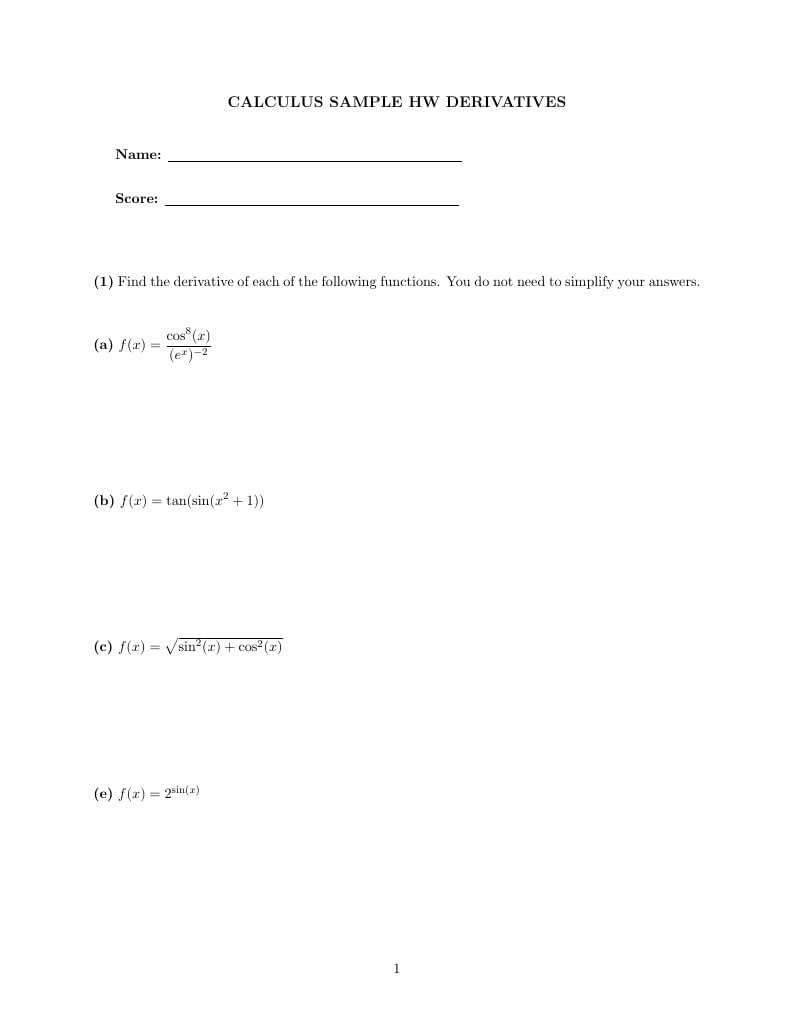
Sample Homework for Derivatives
Author:
Scott Brewer
Last Updated:
6 years ago
License:
Creative Commons CC BY 4.0
Abstract:
Sample Homework for Derivatives

\begin
Discover why over 25 million people worldwide trust Overleaf with their work.
Sample Homework for Derivatives

\begin
Discover why over 25 million people worldwide trust Overleaf with their work.
\documentclass[letterpaper,11pt]{article}
\usepackage[margin=1 in]{geometry}
\usepackage{calc}
\usepackage{amsmath, mathtools, comment, graphicx, fancyhdr, color, setspace, multicol, hyperref}
\usepackage{tikz,tikz-3dplot,pgfplots}
\usepackage{amssymb}
\usepackage{amsthm}
\usepackage{latexsym}
\usepackage{epsfig}
\usepackage{amscd}
\usepackage{arydshln}
\usepackage{graphicx}
\usepackage{pst-plot}
\usepackage{pst-math}
\parskip = 0.2in
\def\ds{\displaystyle}
\newif\ifsolutions
\solutionsfalse
\ifsolutions
\newcommand{\tsol}[1]{\textcolor{red}{#1}}
\else
\newcommand{\tsol}[1]{\textcolor{white}{#1}}
\fi
\begin{document}
%%%%%%%%%%%%%%%%%%%%%%%%%%%%%%
\begin{center} {\large \textbf{CALCULUS SAMPLE HW DERIVATIVES}}
\end{center}
{ \textbf{Name:} \underline{\hspace{8cm}}
\medskip
\textbf{Score:} \underline{\hspace{8cm}}}
\bigskip
\bigskip
\bigskip
\noindent \textbf{(1)} Find the derivative of each of the following functions. You do not need to simplify your answers.
\vspace{.5cm}
\noindent \textbf{(a)} $f(x) = \ds \frac{\cos ^8 (x)}{(e^x)^{-2}}$
\vspace{3cm}
\noindent \textbf{(b)} $f(x) = \tan (\sin ( x^2+1))$
\vspace{3cm}
\noindent \textbf{(c)} $f(x) = \sqrt{\sin ^2(x) + \cos ^2(x)}$
\vspace{3cm}
\noindent \textbf{(e)} $f(x) = 2^{\sin (x)}$
\newpage
\noindent \textbf{(2)} Find the equation of the tangent line to the graph of $f(x) = \ds \tan (e^{x^2})$ at the point where $x=0$. You may leave your answer in point-slope form.
\vspace{5cm}
\noindent \textbf{(3)} Find $y'$ (equivalently, $\ds \frac{dy}{dx}$) using implicit differentiation:
\noindent \textbf{(a)} $\sin(x - y) = xy$
\vspace{5cm}
\noindent \textbf{(b)} $e^{x+y} = y$
\newpage
\noindent \textbf{(4)} Find the slope of the tangent line to the graph of $x^2+y^2 = 5$ at the point $(1,2)$.
\vspace{7cm}
\noindent \textbf{(5)} If $f(x) = x^5$ and $g$ is its inverse function. Find $g'(y_0)$ if $y_0 = 32$.
\vspace{4cm}
\noindent \textbf{(6)} Find the derivative of $f(x) = \sin ^{-1}(4x)$.
\end{document}